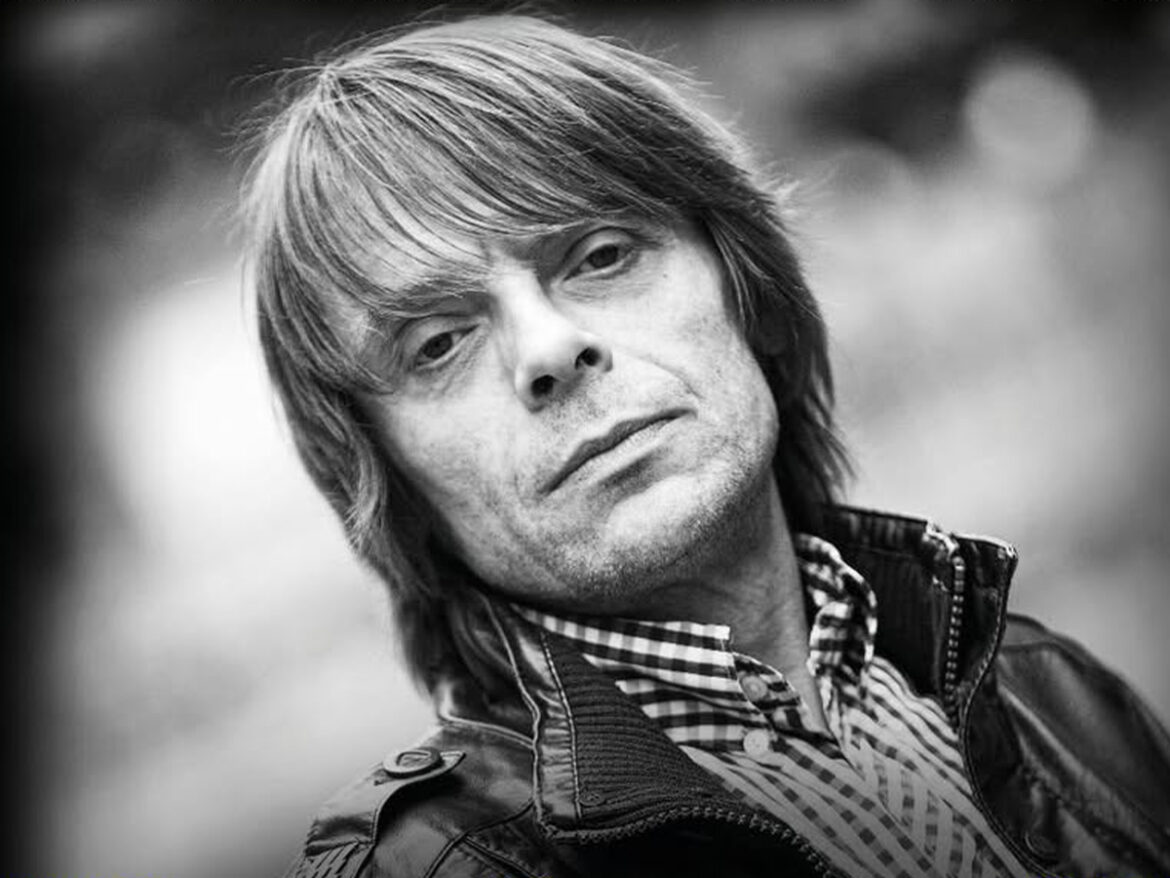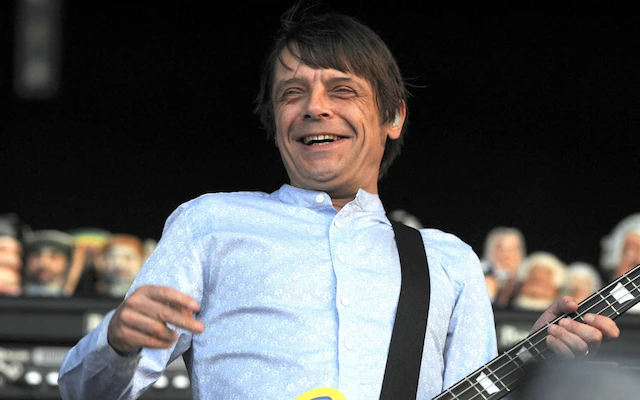
Gary “Mani” Mounfield was one of the most influential and beloved bassists in British rock history, best known for his membership in The Stone Roses and later Primal Scream.
Mani played a foundational role in shaping the sound of the Madchester era and, more broadly, the evolution of indie rock, dance-rock fusion, and psychedelic alternative music. His playing was deeply melodic, fluid, and grooving — unmistakable and unforgettable. But beyond his musicianship, Mani was admired for his warmth, humor, and authenticity, a man whose spirit resonated just as profoundly as the notes he played.
Early Life
Gary Mounfield was born on November 16, 1962 in Crumpsall, Manchester, and raised in a working-class environment where music was a constant companion. From a young age, he was drawn to rhythm — not as formal study, but as a natural inclination. He grew up surrounded by the cultural tapestry of Manchester, where soul, rock, punk, reggae, and emerging dance music intermingled. That eclectic mix seeped into Mani’s musical instincts long before he ever joined a band.
He left school at sixteen and later attended Xaverian College in Rusholme, though his heart was always in music. Even as a teenager, he was known among friends for his natural sense of groove and his outgoing personality. Manchester in the late 1970s and early 1980s was a hotbed of musical experimentation, and Mani absorbed everything he heard: punk’s rawness, funk’s elasticity, reggae’s depth, and rock’s melodic contours — all of which would become part of his signature style.
Early Bands and the Road to The Stone Roses
Before joining The Stone Roses, Mani played in various small local bands, most notably the Fireside Chaps, which included future Roses members in early formations. When the Stone Roses began to take shape, Mani initially wasn’t their bassist — but fate intervened when the original bassist left. Mani picked up the bass role, and it was an instant, almost cosmic match. His musical instincts completed the band’s chemistry, turning them from an interesting local act into something special.
By the mid-1980s, The Stone Roses had solidified their lineup: Ian Brown on vocals, John Squire on guitar, Reni on drums, and Mani on bass. Each member brought something distinct, but Mani’s arrival was the final puzzle piece. He didn’t just “play bass” — he created movement, providing lyrical bass lines that danced alongside the drums rather than simply anchoring them.
His Rickenbacker 4005, famously finished with a paint-splatter design reminiscent of Jackson Pollock, became visually symbolic of the Roses’ fusion of art, attitude, and psychedelia.
The Stone Roses and the Madchester Explosion
The Stone Roses’ self-titled debut album, released in 1989, transformed British music. It inspired a generation of musicians and became the cornerstone of the burgeoning Madchester scene — a cultural moment that fused alternative rock with dance music, acid house influences, and the rising rave culture of the late ‘80s.
Mani’s bass playing was crucial to that sound. His lines were smooth yet driving, melodic yet rhythmic, precise yet playful. His interplay with Reni was legendary: few rhythm sections in rock history exhibit such telepathic synchronicity. In tracks like “I Wanna Be Adored,” “Waterfall,” “Fools Gold,” and “I Am the Resurrection,” Mani’s bass is not accompaniment — it is the engine, the pulse, the heartbeat.
.
The Roses weren’t simply a band; they were a movement. Their concerts became iconic. The 1990 Spike Island concert, held in a derelict chemical site in Cheshire, symbolized an entire generation’s cultural crescendo. Though plagued by logistical issues, Spike Island became legendary precisely because of its mythology — and Mani’s bass lines were the soundtrack to that myth.
The band’s second album, Second Coming, arrived in 1994 after years of label battles and internal tension. Its sound leaned more toward blues-rock and extended jams, but Mani’s bass remained a glue that held the sprawling arrangements together.
After the Roses: Joining Primal Scream
In 1996, The Stone Roses disbanded. While the breakup was painful for fans, Mani quickly transitioned into another highly influential chapter of his career: joining Primal Scream.
Primal Scream were at a creative intersection when Mani joined — moving from the dance-rock heights of Screamadelica into darker, more atmospheric territory. Mani fit the band’s evolving direction perfectly. His bass added weight, warmth, and texture to albums such as:
- Vanishing Point (1997)
- XTRMNTR (2000)
- Evil Heat (2002)
- Riot City Blues (2006)
- Beautiful Future (2008)
These albums blended dub, punk, electronic music, noise rock, and psychedelia. Mani adapted effortlessly, proving his versatility beyond the Madchester mold. He could throb like a dub bassist, punch like a punk bassist, or glide like a funk bassist — sometimes all within the same song.
During his fifteen years with Primal Scream, Mani solidified himself as more than a strong player in a great band: he was one of Britain’s finest contemporary bassists, capable of reinventing himself and shaping the sonic identity of any project he joined.
Side Projects, Collaborations, and Public Persona
Mani always had broad musical curiosity. In the 2000s, he joined a unique supergroup called Freebass, composed of three legendary bassists: Mani, Peter Hook of Joy Division/New Order, and Andy Rourke of The Smiths. The project was ambitious and unusual — three bassists playing together in layered harmonies and counterrhythms. While Freebass was short-lived, it represented Mani’s adventurous spirit and willingness to step outside traditional roles.
He also made a cameo in 24 Hour Party People, the 2002 film chronicling Manchester’s music scene, further cementing his association with the city’s cultural legacy.
Charity work and community involvement were important to him as well. He regularly supported causes connected to Manchester and participated in events such as Manchester Versus Cancer, where he reunited onstage with Ian Brown for a performance of “I Am the Resurrection.”
Mani was celebrated not only for his musicianship but for his personality. Known as warm, charismatic, and self-effacing, he was often described as the emotional core of any band he joined. Fans adored him because he embodied the Manchester spirit — honest, down-to-earth, and full of heart.
Reuniting The Stone Roses
In 2011, Mani left Primal Scream to rejoin The Stone Roses for a long-awaited reunion. The news electrified fans worldwide. For many, The Stone Roses were the greatest British band since The Smiths, and Mani’s return was a signal that the magic could happen again.
The band embarked on massive reunion shows, including triumphant appearances at Heaton Park and major festivals globally. They released two new songs, “All for One” and “Beautiful Thing,” which, even decades after their debut, showed the band’s signature chemistry.
Though the reunion never resulted in a full album, it strengthened their legacy and allowed a new generation to see the band live. Mani remained an essential part of this chapter, performing with the same enthusiasm and groove that had defined his younger years.
Personal Life
Offstage, Mani lived a fulfilling and grounded life. He resided in Heaton Moor, Stockport, and remained a lifelong supporter of Manchester United. He was also proud of his Irish heritage, which shaped his upbringing and personal identity.
He met his wife, Imelda, while recording Second Coming at Rockfield Studios. The couple later had twin sons and shared a close, loving relationship. Her death from cancer in 2023 deeply affected Mani, and many who knew him spoke of the profound grief he carried afterward. Yet he continued to honor her memory publicly and privately, often speaking of her with immense affection.
He also had a passion for darts — a quirky but beloved personal detail known among fans — and was often seen enthusiastically discussing the sport.
Later Years and Passing
In the months before his death, Mani was preparing a nationwide speaking tour scheduled for 2026–2027. Titled The Stone Roses, Primal Scream, and Me, it was intended as a reflective, intimate look back at his life in music. Fans were eager to hear his stories — from Spike Island to Primal Scream’s experimental eras, from reunion tours to personal triumphs and tragedies.
Mani died on November 20, 2025, at the age of 63. He collapsed at home, and although emergency services responded, he could not be revived.
His death marked the end of an era — not only for the Madchester generation but for anyone who believed in the power of music that grooves, uplifts, and unites.

Style and Legacy
Mani’s musical legacy is defined by several key qualities:
1. Groove Above All
His bass lines weren’t just rhythmic; they were melodic, fluid, and essential. He understood how bass could sing while still driving a song forward. He made people dance — whether they were at a club, a gig, or listening alone in their rooms.
2. Unique Rhythm Section Chemistry
With Reni in The Stone Roses, Mani formed one of the tightest rhythm sections in British rock history. Their interplay was effortless and deeply musical, creating grooves that remain iconic.
3. Versatility Across Genres
Mani thrived in rock, dance, dub, shoegaze, punk, and experimental electronic settings. Few bassists transition so smoothly between such diverse styles.
4. Influence on Generations
Countless bassists cite Mani as an influence, drawn to his melodic approach, understated brilliance, and rhythmic sensitivity. His playing on the Roses’ debut album alone remains a masterclass.
5. A Humble, Loved Human Being
Perhaps more than anything, Mani is remembered for his humility. He often deflected praise, calling himself “just the bass player,” but everyone around him saw his depth — as an artist and as a person.
Conclusion
Gary “Mani” Mounfield lived a life that shaped the soundtrack of a generation. From the psychedelic grooves of The Stone Roses to the radical reinventions of Primal Scream, his bass playing became an essential component of Britain’s musical identity from the late 1980s onward.
He was a musician who could make a single note feel like a whole movement. A man whose presence lit up rooms and stages. A figure whose work inspired joy, reflection, dance, and devotion.
His passing leaves a silence, but the grooves he created — the heartbeat of songs loved by millions — continue to resonate. Through his music, Mani lives on, eternally embedded in the soundscape of modern British rock.
Check out The Stone Roses on Amazon by clicking here.
Check out Primal Scream on Amazon by clicking here.
If you found this interesting please share it with your friends and family, and check out some of our other articles on Musicians who Died in 2025.
.

